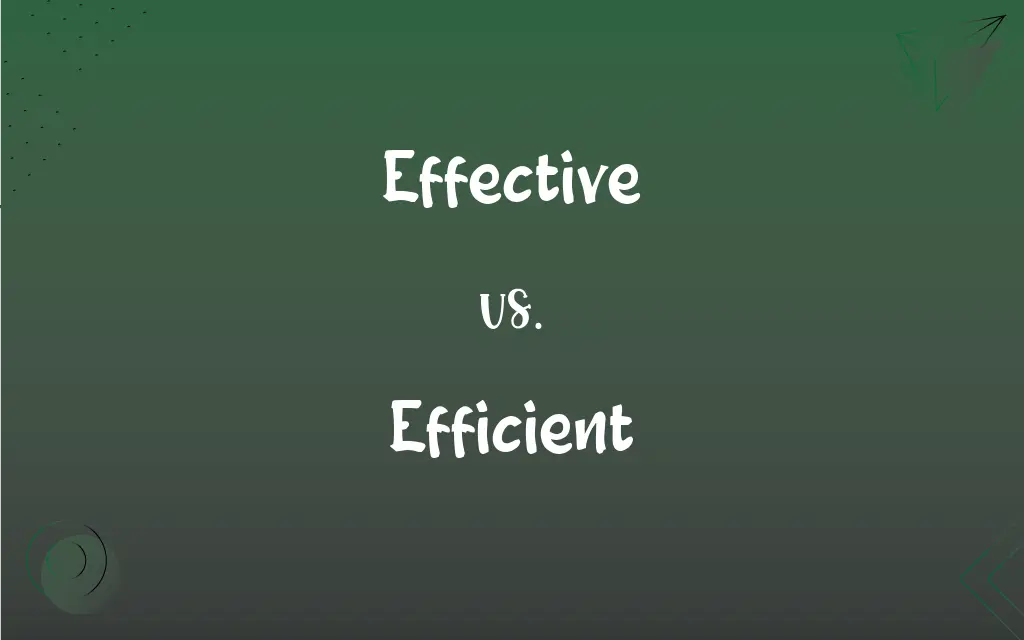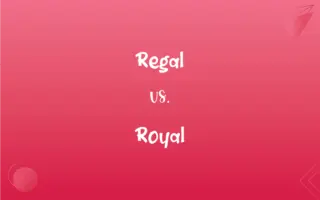Effective vs. Efficient: What's the Difference?
Edited by Aimie Carlson || By Harlon Moss || Published on January 23, 2024
Effective means producing the desired result, while efficient means achieving a result with minimal wasted effort or resources.

Key Differences
"Effective" relates to the ability to achieve a specific goal or result. It implies success in producing a desired or intended outcome. "Efficient," on the other hand, refers to the optimal use of resources (time, energy, effort) to achieve a result, emphasizing minimal waste.
An effective method might not always be the most efficient if it requires a lot of resources or time. Conversely, an efficient approach may not always be the most effective if it does not fully achieve the desired outcome.
Effectiveness is about doing the right things to achieve an end goal, focusing on the quality of the outcome. Efficiency is about doing things in the right manner, focusing on the process and resource utilization.
In business, an effective strategy directly contributes to achieving the company’s objectives. An efficient strategy, however, is more about maximizing productivity with the least amount of expense or waste.
In personal productivity, being effective means accomplishing meaningful tasks that align with your goals. Being efficient means managing your tasks in a way that reduces wasted time and effort.
ADVERTISEMENT
Comparison Chart
Focus
Achieving the desired outcome
Minimizing waste of resources
Measure of Success
Achievement of objectives
Optimal use of time, energy, resources
Key Consideration
Quality and impact of the outcome
Process and method efficiency
In Business
Strategy effectiveness in goals
Cost-effective and time-saving processes
In Personal Tasks
Completing important, goal-aligned tasks
Managing tasks with minimal waste
ADVERTISEMENT
Effective and Efficient Definitions
Effective
Capable of producing a desired result.
The new advertising campaign was effective in boosting sales.
Efficient
Functioning in the best possible manner with least waste.
The new machine is more efficient than the old one.
Effective
Successful in achieving a purpose.
Her speech was effective in swaying the audience's opinion.
Efficient
Achieving maximum productivity with minimum wasted effort.
His efficient working style completed the project ahead of schedule.
Effective
Functioning in a desired or intended way.
The new policy was effective in reducing traffic congestion.
Efficient
Effective without wasting time or effort.
His efficient research methods yielded quick results.
Effective
Producing a strong impression or response.
The teacher's effective methods improved student performance.
Efficient
Using resources such as time and energy optimally.
Her efficient planning resulted in a successful event.
Effective
Having an intended or expected effect.
Efficient
Achieving a goal with minimal effort and expense.
The team’s efficient approach saved the company money.
Effective
Producing a strong impression or response; striking
Gave an effective performance as Othello.
Efficient
Acting or producing effectively with a minimum of waste, expense, or unnecessary effort
An efficient builder.
An efficient factory.
FAQs
How do effectiveness and efficiency relate in business?
In business, effectiveness is about reaching goals, while efficiency is about the optimal use of resources.
Can a method be effective but not efficient?
Yes, a method can achieve its goal (effective) but use resources wastefully (not efficient).
What does it mean to be effective?
Being effective means successfully achieving a desired or intended result.
What is the meaning of efficient?
Efficient refers to achieving goals with minimal waste of time, resources, and effort.
Does efficiency relate to the process?
Yes, efficiency relates to how well the process uses resources.
In a workplace, which is more important, effective or efficient?
Both are important; effectiveness in achieving goals and efficiency in resource utilization.
Is it possible to be efficient but not effective?
Yes, one can use resources wisely (efficient) but not fully achieve the desired outcome (not effective).
Can efficiency lead to effectiveness?
Sometimes, as efficient methods can contribute to achieving goals effectively.
Can effectiveness be measured?
Yes, by how well the intended goals are achieved.
How do I improve my effectiveness?
Focus on aligning your actions with your desired outcomes.
Is it better to focus on being effective or efficient?
It depends on the context; sometimes the goal is more important (effective), other times resource use is crucial (efficient).
In time management, what's more crucial?
Both are crucial; effectiveness in choosing what to do, and efficiency in how to do it.
Can a person be both effective and efficient?
Absolutely, one can achieve goals successfully (effective) while also optimizing resource use (efficient).
Can a strategy be both effective and efficient?
Ideally, strategies should aim to be both to achieve the best outcomes.
Is effectiveness more about the end result?
Yes, effectiveness focuses on achieving the desired end result.
Are there tools to measure effectiveness and efficiency?
Yes, there are various analytical tools and metrics for measuring both.
Does technology improve effectiveness and efficiency?
Generally, yes, by streamlining processes and enhancing capabilities.
How can I be more efficient?
Streamline your processes and eliminate unnecessary steps or resource usage.
What are indicators of efficiency?
Indicators include time saved, resources conserved, and reduced costs.
Is being efficient enough to succeed?
Not always; success often requires both efficiency and effectiveness.
About Author
Written by
Harlon MossHarlon is a seasoned quality moderator and accomplished content writer for Difference Wiki. An alumnus of the prestigious University of California, he earned his degree in Computer Science. Leveraging his academic background, Harlon brings a meticulous and informed perspective to his work, ensuring content accuracy and excellence.
Edited by
Aimie CarlsonAimie Carlson, holding a master's degree in English literature, is a fervent English language enthusiast. She lends her writing talents to Difference Wiki, a prominent website that specializes in comparisons, offering readers insightful analyses that both captivate and inform.






































































